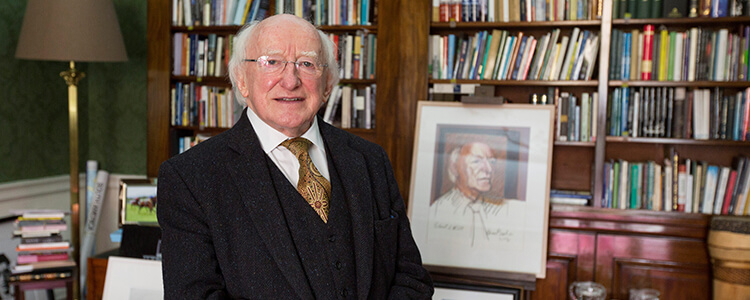
Centenary Programme Guide “A welcome from your President, Michael D. Higgins”
Published: Sat 5 Mar, 2016 | 10:34
The programme of events to which you are all being invited provides a wonderful opportunity to commemorate, in a dignified and ethical way, the actions that led to the foundation of our State. These events also invite us to work together, and in solidarity, in making a vision that is appropriate for our times.
In the guide to the national programme marking the centenary of the 1916 Easter Rising you will find a listing of the events commemorating and celebrating a seminal event in Irish history, when people, with their different ideas for the future of Ireland, came together to pursue what they shared, a dream of independence.
That the signatories of the Easter Proclamation, their families and their dependents were selfless in their aspirations for Irish independence cannot be doubted. They may have differed in the priorities they emphasised within their definition of freedom, but they all pursued freedom in its fullest sense. Some gave priority to women’s rights, others to the right to participate in public life, political rights, and a distinguished number sought pacifism, egalitarianism, and the rights of workers by hand and brain. The fact that they pooled their efforts, were united in a symbolic strike against empire in a time of great change, created for us the possibilities we enjoy today.
We, in our turn, are called upon to define these possibilities, in peace and with creativity.
This year, we should not just celebrate the vision, courage and dedication of people whose beliefs and actions led to our independence; we should take the possibility of ensuring that our future is one that is free from any distortions of history or affected amnesia. We must be free to engage with the full richness of our history, the diversity of our people, their histories, and the events that make up the communities we are today and wish to be in the future.
The centenary invites us to reflect on the events of the past, so that we might remember and honour, but also understand more deeply and interpret more accurately. We have the benefit of an expanded scholarship, newly released archives, oral histories, and new analyses. With these advantages, and informed by our experiences as a nation over the past century, we are now all the more able to consider not just the ideals that inspired the joining of forces of Irish nationalism and various revolutionary, social, cultural and language movements – but also the Rising’s setting, that of a global war that would involve six empires, a war which would devour an entire generation of the young.
The leaders of the Rising were not only inspired by events in Ireland and in Irish history; they were aware, wrote of, and took part in international developments such as the campaign for women’s suffrage. Many lost their lives abroad in the violent clash of colonial empires. As public intellectuals and activists, they worked for the emergence of a concept of rights, of states, of workers, of citizens and of minority groups. The centenary celebrations are thus not merely about looking back, in any singular way.
This year, we are invited to consider the full complexity of our common history, as well as to reflect on how the ideals formulated a century ago might apply today, in very different global settings, in a world that has yet to bear the imprint of peace, freedom from hunger, sustainability or solidarity placed upon it. Easter 2016 should be a moment for us, together, to recognise the great gift that is our independence, as well as the duties that come with the privilege of freedom and prosperity.
The space of a republic having been won, its filling with the content of a real republic, with the appropriate rights and responsibilities, delivered in solidarity, informed by care, in a public space, remains for us as a challenge.
Our commemoration of that foundational and complex decade in our history must also be inclusive as we add the names of the many unsung heroes of the time; the people that history forgot. For example, the names of all the children who died during the Rising. The names, also, of those many women who played crucial roles in the insurrection, as fighters, activists, fundraisers, carers and organisers.
Our picture of the Rising must include not just the leaders but all those who suffered, so many who were too poor, too marginalised and too disenfranchised to be heard. As we recall those 485 men, women and children who died in Dublin that week, most of them civilians, we should remember those soldiers, so many of them from the tenements, who were among the 580 Irish killed, in that same week, on the Western Front.
This Easter, we are reminded that history matters, as a subject and as a practice. Our history is all around us, it is in the streets we walk, the language we speak, in the lie of our fields and in the buildings in which we live and work. It is there in the stories we tell. During 2016, we must also remind ourselves of our ethical obligations, to remember that there never can be just one version of the past, that we are all custodians of that history, always remaining open to be recipients of stories and accounts of the past, not only those handed on to us by previous generations, but the stories of those who differ from us, and to which we must offer a hospitality of hearing.
We must embrace the multitude of stories that comprise our past, in all their bewildering contradictions and differences. Let us do it with generosity.
MICHAEL D HIGGINS
UACHTARÁN NA hÉIREANN
Extract from Irish Independent supplement, Ireland 2016 Centenary Programme Guide
Photo: Mark Condren
